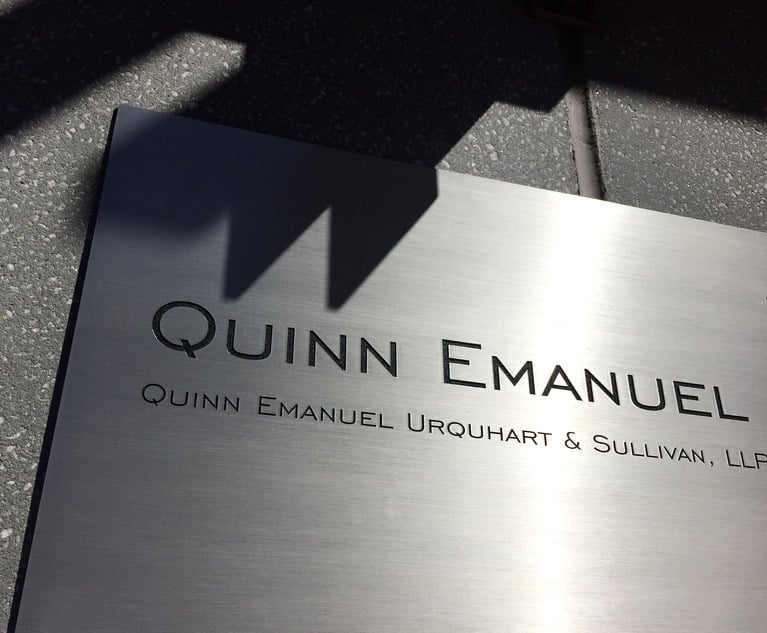In 2018, Law Firms Will Face Greater Challenges Than Slow Growth
A new report by Citi Private Bank's Law Firm Group finds that a slow-growth market for legal services will not abate in 2018. That's just one of several issues facing managing partners as their partnerships continue to age and more competitors squeeze onto their turf.
December 14, 2017 at 07:00 AM
5 minute read

The slow-growth market for legal services will not abate in 2018, states a report from Citi Private Bank's Law Firm Group set to be released Thursday, although that will not be the only challenge facing managing partners as their partnerships continue to age and more competitors squeeze onto their turf.
In many ways, the report, co-authored by Hildebrandt Consulting, expects the market for law firms in 2018 to be similar to this year, which through three quarters Citi claims has resulted in revenue growth of 3.6 percent; expenses growth of 3.8 percent; and demand stalling by 0.2 percent. The report expects mid-single digit growth in revenue and profits per equity partner in 2018.
Volatility will continue across the market in 2018, according to the report. Firms that saw revenue growth in 2017 are far from guaranteed the same result next year, as one firm's growth is increasingly seen as coming at the expense of other firms.
“The most pressing point about 2018 is the market will continue to grow modestly, and in a market where there is such wide dispersion, the question is how will you be the firm who is on the 50 percent of the equation who is growing?” said Gretta Rusanow, head of advisory services in Citi's Law Firm Group. “How are you going to be able to win that work from other firms?”
➤➤ Check out The Law Firm Disrupted, a new weekly briefing by Roy Strom that surveys the competitive pressures on modern law firms. A benefit of your American Lawyer or Law.com All-Access subscription. Sign up here.
Increased lateral hiring activity and continued consolidation through mergers or large group hires are some ways firms will look to grow. The Citi report stated that activity is primarily driven by volatility in the industry. With more than 75 law firm mergers announced through three quarters this year, a recent analysis by legal consultancy Altman Weil Inc.'s MergerLine put the legal industry on pace for another record year of combinations. (And more could be in the offing, according to sibling publication the New York Law Journal.)
Still, those tactics are not without risks. The Citi study noted that firm leaders reported 59 percent of lateral hires made from 2011 to 2016 were deemed a financial success. Mergers, too, can bring trouble, especially if they are viewed primarily as a way to capture market share.
“These combinations will never perform as well as tactical, synergistic moves to strengthen market positions or enter new markets,” stated the report. “We also do not subscribe to the notion that a combination can remedy underlying systemic challenges that both participant firms are facing independently, as some combinations have sought to do.”
Apart from the immediate market conditions, 2018 will bring into sharper relief longer-term challenges facing managing partners. High on that list is the changing leverage model for large law firms.
After years of closely controlling the ranks of equity partners, Citi found that 32 percent of equity partners are now at or approaching retirement age. The report expects “an onslaught” of partner retirements in the coming years, a subject covered in detail by The American Lawyer last year. Firms may not be well-positioned to deal with them, according to the report, due to a lack of talent management in their younger partner ranks or senior associate tier.
“Part of that is because so much of the growth in the past three to four years has been through lateral partners,” said Brad Hildebrandt of Hildebrandt Consulting. “So there were very little associates [that] made equity partners. And I think what you've had is a kind of bulk-up in the middle, but not all those people performing all that well. The long-term issue is where is the new talent coming from? That's the issue.”
The report by Hildebrandt and Citi claims “the vast majority” of law firm partners have told them that they expect to increase the number of associates at their firms. Meanwhile, there is pressure on income partners, with only one-third of firms planning to increase that group of lawyers.
On top of those demographic concerns, firms will increasingly face competition from alternative legal providers next year and beyond, according to the report. The Big Four accounting firms figure to be major players, as the report noted that the group is well-suited to respond to client demands for efficient delivery of legal services. The Big Four's annual spending on technology and training in a year eclipses the revenue of any given law firm, according to the report.
While most of the current competition from the Big Four comes in legal markets outside the United States, Citi's Rusanow said it would be a mistake to think that doesn't mean they can compete in providing a wide swathe of legal services. The Big Four can handle cross-border work and Rusanow believes their investments in technology will make them a competitor to efficiently handle tasks that have made up the majority of associates' time for years.
“That all suggests that they will be a market force at some stage,” Rusanow said.
This content has been archived. It is available through our partners, LexisNexis® and Bloomberg Law.
To view this content, please continue to their sites.
Not a Lexis Subscriber?
Subscribe Now
Not a Bloomberg Law Subscriber?
Subscribe Now
NOT FOR REPRINT
© 2025 ALM Global, LLC, All Rights Reserved. Request academic re-use from www.copyright.com. All other uses, submit a request to [email protected]. For more information visit Asset & Logo Licensing.
You Might Like
View All
U.S.- China Trade War: Lawyers and Clients Left 'Relying on the Governments to Sort This Out'

Willkie Adds Five-Lawyer Team From Quinn Emanuel in Germany


Trending Stories
- 1States Accuse Trump of Thwarting Court's Funding Restoration Order
- 2Microsoft Becomes Latest Tech Company to Face Claims of Stealing Marketing Commissions From Influencers
- 3Coral Gables Attorney Busted for Stalking Lawyer
- 4Trump's DOJ Delays Releasing Jan. 6 FBI Agents List Under Consent Order
- 5Securities Report Says That 2024 Settlements Passed a Total of $5.2B
Who Got The Work
J. Brugh Lower of Gibbons has entered an appearance for industrial equipment supplier Devco Corporation in a pending trademark infringement lawsuit. The suit, accusing the defendant of selling knock-off Graco products, was filed Dec. 18 in New Jersey District Court by Rivkin Radler on behalf of Graco Inc. and Graco Minnesota. The case, assigned to U.S. District Judge Zahid N. Quraishi, is 3:24-cv-11294, Graco Inc. et al v. Devco Corporation.
Who Got The Work
Rebecca Maller-Stein and Kent A. Yalowitz of Arnold & Porter Kaye Scholer have entered their appearances for Hanaco Venture Capital and its executives, Lior Prosor and David Frankel, in a pending securities lawsuit. The action, filed on Dec. 24 in New York Southern District Court by Zell, Aron & Co. on behalf of Goldeneye Advisors, accuses the defendants of negligently and fraudulently managing the plaintiff's $1 million investment. The case, assigned to U.S. District Judge Vernon S. Broderick, is 1:24-cv-09918, Goldeneye Advisors, LLC v. Hanaco Venture Capital, Ltd. et al.
Who Got The Work
Attorneys from A&O Shearman has stepped in as defense counsel for Toronto-Dominion Bank and other defendants in a pending securities class action. The suit, filed Dec. 11 in New York Southern District Court by Bleichmar Fonti & Auld, accuses the defendants of concealing the bank's 'pervasive' deficiencies in regards to its compliance with the Bank Secrecy Act and the quality of its anti-money laundering controls. The case, assigned to U.S. District Judge Arun Subramanian, is 1:24-cv-09445, Gonzalez v. The Toronto-Dominion Bank et al.
Who Got The Work
Crown Castle International, a Pennsylvania company providing shared communications infrastructure, has turned to Luke D. Wolf of Gordon Rees Scully Mansukhani to fend off a pending breach-of-contract lawsuit. The court action, filed Nov. 25 in Michigan Eastern District Court by Hooper Hathaway PC on behalf of The Town Residences LLC, accuses Crown Castle of failing to transfer approximately $30,000 in utility payments from T-Mobile in breach of a roof-top lease and assignment agreement. The case, assigned to U.S. District Judge Susan K. Declercq, is 2:24-cv-13131, The Town Residences LLC v. T-Mobile US, Inc. et al.
Who Got The Work
Wilfred P. Coronato and Daniel M. Schwartz of McCarter & English have stepped in as defense counsel to Electrolux Home Products Inc. in a pending product liability lawsuit. The court action, filed Nov. 26 in New York Eastern District Court by Poulos Lopiccolo PC and Nagel Rice LLP on behalf of David Stern, alleges that the defendant's refrigerators’ drawers and shelving repeatedly break and fall apart within months after purchase. The case, assigned to U.S. District Judge Joan M. Azrack, is 2:24-cv-08204, Stern v. Electrolux Home Products, Inc.
Featured Firms
Law Offices of Gary Martin Hays & Associates, P.C.
(470) 294-1674
Law Offices of Mark E. Salomone
(857) 444-6468
Smith & Hassler
(713) 739-1250










